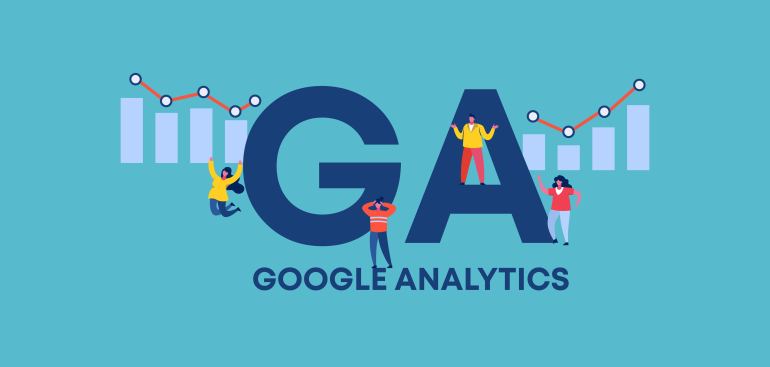
5 key benefits of upgrading to Google Analytics 4 (GA4)
In today's digital landscape, data is king. For businesses of all sizes, Google Analytics has been a go-to tool for collecting and analyzing data about website traffic, user behavior, and marketing performance. However, with the release of Google Analytics 4 (GA4), there are even more reasons to upgrade to this new version.
GA4 provides a wealth of new features and insights that can help you make better decisions about your marketing efforts, from improved path analysis and event tracking to predictive metrics and data privacy controls. Plus, with Google Tag Manager fully integrated, it's easier than ever to manage all your marketing and analytics tags in one place.
Here are 5 key benefits of upgrading to GA4:
-
Path Analysis
Path analysis is a new feature in GA4 that allows you to visualize the paths users take through your website, from the first interaction to conversion. With path analysis, you can see the most common paths users take, where they drop off, and where they convert. This information is crucial for understanding how users navigate your website and can help you identify areas where you may need to make improvements.
For example, let's say you own an e-commerce store and you notice that a large number of users are dropping off during the checkout process. By using path analysis, you can see exactly where users are dropping off and identify any potential issues. Perhaps users are encountering a technical issue on the payment page, or maybe the checkout process is too complicated or lengthy. Armed with this information, you can make changes to improve the checkout process and reduce drop-offs.
-
Predictive Metrics
Another exciting feature of GA4 is predictive metrics. Predictive metrics use machine learning to analyze patterns in user behavior and make predictions about future user behavior. With predictive metrics, you can gain insights into what actions users are likely to take in the future, such as making a purchase or completing a form.
This information can be incredibly useful for marketers, as it allows you to anticipate user behavior and adjust your marketing strategies accordingly.
For example, if predictive metrics indicate that a user is likely to make a purchase, you could target them with a specific promotion or offer to encourage them to complete the purchase. Similarly, if predictive metrics indicate that a user is unlikely to complete a form, you could try adjusting the form or offering an incentive to encourage completion.
-
Cross-Device Tracking
One of the challenges of traditional Google Analytics is that it doesn't track user behavior across different devices. For example, if a user visits your website on their mobile phone and then later makes a purchase on their desktop computer, you may not be able to track that user's behavior as a single session. This can make it difficult to get a complete picture of user behavior and can lead to inaccuracies in your data.
GA4 addresses this issue with cross-device tracking. With GA4, you can track user behavior across different devices and see how users are interacting with your website over time. This information can help you better understand user behavior and tailor your marketing strategies accordingly.
For example, if you notice that a large number of users are visiting your website on their mobile phones but making purchases on their desktop computers, you could adjust your mobile experience to make it easier for users to make purchases on their smartphones.
-
Integration with Google Tag Manager
Google Tag Manager (GTM) is a powerful tool that allows you to manage and deploy tags on your website without having to edit your website's code. With GTM, you can easily add tags for things like Google Analytics, Facebook Pixel, and other third-party tools.
GA4 integrates seamlessly with GTM, making it even easier to track user behavior and analyze your website's performance. With GA4 and GTM, you can set up custom events and triggers to track specific user interactions, such as clicks on a particular button or form submissions. This information can help you better understand how users are interacting with your website and can help you make more informed marketing decisions.
-
Future-Proofing
Finally, upgrading to GA4 is a great way to future-proof your website analytics. With traditional Google Analytics, it was difficult to track user behavior on emerging technologies such as voice search, smart speakers, and IoT devices. However, GA4 has been designed with these technologies in mind and can track user behavior on these emerging platforms.
This means that by upgrading to GA4, you can future-proof your website analytics and ensure that you're able to track user behavior on whatever emerging technologies come next. This is particularly important as more and more users are using emerging technologies to interact with brands and make purchases online.
In addition, GA4 is designed to be more privacy-focused than traditional Google Analytics. With increased concerns around user privacy and data protection, GA4's privacy features can help ensure that your website analytics are compliant with regulations such as GDPR and CCPA.
Upgrading to Google Analytics 4 (GA4) can offer a number of benefits for website owners and marketers. From path analysis to predictive metrics, cross-device tracking to integration with Google Tag Manager, and future-proofing your website analytics, there are plenty of reasons to consider making the switch.


Leave a comment
Make sure you enter all the required information, indicated by an asterisk (*). HTML code is not allowed.